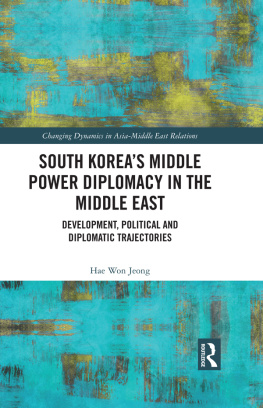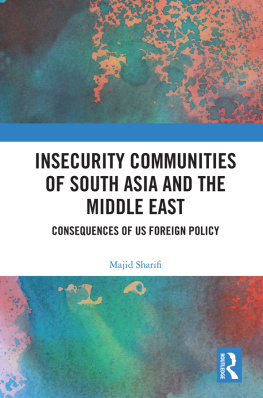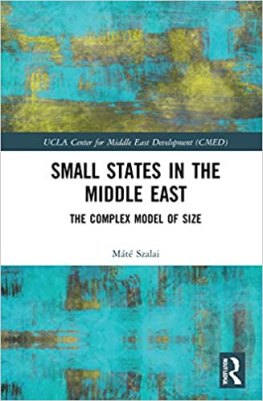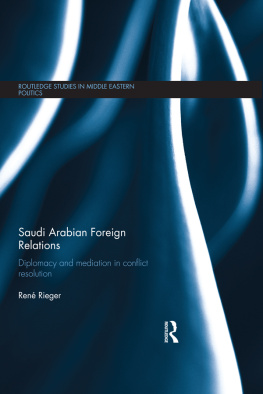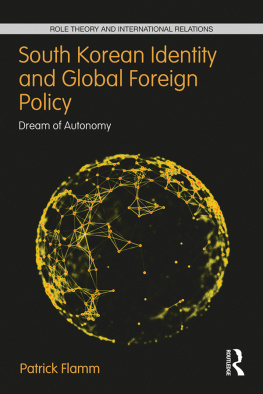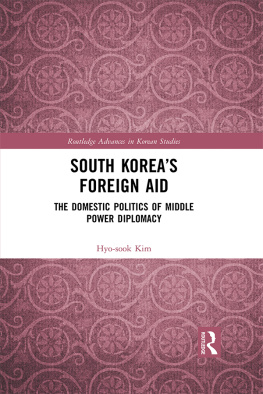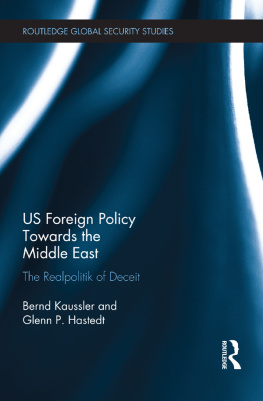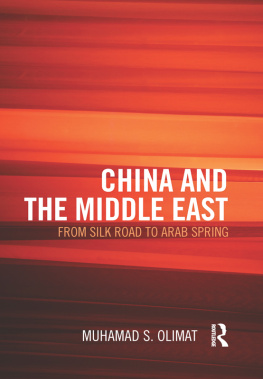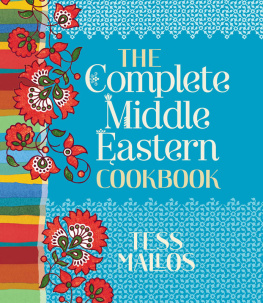South Koreas Middle Power Diplomacy in the Middle East
This book examines the theoretical and empirical approaches to the study of middle powers with reference to South Koreas bilateral relations with Iran, Saudi Arabia, the UAE, and Iraq.
It maps the development, political, and diplomatic trajectories between South Korea and Iran, Saudi Arabia, the UAE, and Iraq against the historical backdrop of ROKU.S. alliance and the rise of China. Jeong provides a nuanced analysis of the intersectionality of political economy and foreign policy analysis contextualizing the state-building processes in ROK and the Middle Eastern countries.
This accessible book is intended for students and scholars in area studies and international affairs, career diplomats, and South Korean businesses in the Middle East. It should also prove of practical value for journalists and policy makers who are interested in studying the nexus of domestic, regional, and international factors that have configured South Koreas Middle East policy.
Hae Won Jeong is Assistant Professor at Abu Dhabi University. She specializes in international politics of the Middle East and has published on GulfAsia relations, foreign policy, and public diplomacy of the Middle East and nation-building in the Gulf.
Changing Dynamics in Asia-Middle East Relations
Series editor: Jonathan Fulton
A number of political and economic initiatives in recent years underscore the surge in relations across Eurasia and the Indian Ocean region. The USAs Indo-Pacific strategy, Chinas Belt and Road Initiative, Indias Look East and Look West strategies, and several less formal but no less important state-to-state relationships all indicate that ties across Eurasia are growing. Economic relations between Persian Gulf states and various Asian energy markets have diversified to the point that trade, investment and finance are complemented with diplomatic and security cooperation. Soft power initiatives are building relations across non-elite levels, creating familiarity in language, culture, and religion. At the same time, increased interactions present potential for tensions as competition between Asian states plays out in the Middle East, and Middle Eastern rivalries affect the trajectory of Asian states regional involvement.
This series publishes monographs and edited collections on the political, economic, strategic, and diplomatic interactions between Middle East and Asian states. Contributions from a diverse range of perspectives and all regions are welcome on International Relations, International Political Economy, Foreign Policy and issue-specific topics such as security cooperation, politics of sport, politics of religion, energy politics, Belt and Road Initiative and Eurasian development.
For more information, please visit the series webpage:
South Koreas Middle Power Diplomacy in the Middle East
Development, Political and Diplomatic Trajectories
Hae Won Jeong
South Koreas Middle Power Diplomacy in the Middle East
Development, Political and Diplomatic Trajectories
Hae Won Jeong

First published 2022
by Routledge
2 Park Square, Milton Park, Abingdon, Oxon OX14 4RN
and by Routledge
605 Third Avenue, New York, NY 10158
Routledge is an imprint of the Taylor & Francis Group, an informa business
2022 Hae Won Jeong
The right of Hae Won Jeong to be identified as author of this work has been asserted in accordance with sections 77 and 78 of the Copyright, Designs and Patents Act 1988.
All rights reserved. No part of this book may be reprinted or reproduced or utilised in any form or by any electronic, mechanical, or other means, now known or hereafter invented, including photocopying and recording, or in any information storage or retrieval system, without permission in writing from the publishers.
Trademark notice: Product or corporate names may be trademarks or registered trademarks, and are used only for identification and explanation without intent to infringe.
British Library Cataloguing-in-Publication Data
A catalogue record for this book is available from the British Library
Library of Congress Cataloging-in-Publication Data
Names: Jeong, Hae Won, author. Title: South Koreas middle powerdiplomacy in the Middle East: development, political anddiplomatic trajectories / Hae Won Jeong.
Description: Abingdon, Oxon; New York, NY: Routledge, 2022. |Series: Changing dynamics in Asia-Middle East relations |Includes bibliographical references and index.
Identifiers: LCCN 2021043921 (print) | LCCN 2021043922 (ebook) |ISBN 9780367551315 (hardback) | ISBN 9780367551322 (paperback) |ISBN 9781003092100 (ebook)
Subjects: LCSH: Korea (South)Foreign relations2002 |Korea (South)Foreign relationsMiddle East. |Middle EastForeign relationsKorea (South) | Middle powers.
Classification: LCC DS923.27.J46 2022 (print) |LCC DS923.27 (ebook) | DDC 327.519505609/05dc23/eng/20211013
LC record available at https://lccn.loc.gov/2021043921
LC ebook record available at https://lccn.loc.gov/2021043922
ISBN: 978-0-367-55131-5 (hbk)
ISBN: 978-0-367-55132-2 (pbk)
ISBN: 978-1-003-09210-0 (ebk)
DOI: 10.4324/9781003092100
Typeset in Times New Roman
by Newgen Publishing UK
To Abba
Contents
Acknowledgments
I am grateful for the past and present encounters I had with Korean expatriate communities in the Gulf and the inspiration they gave me in writing different sections of this book.
I have had the privilege of gaining exposure to the Middle East since my teenage years through my dedicated parents, Jae Seop Jeong and Jin Kyoung Son. This book would not have been completed without their moral and spiritual support.
I would like to thank the librarians in Abu Dhabi and Seoul for their kind assistance in helping access electronic and archival sources and print sources both remotely and physically during the pandemic.
I would also like to take this opportunity to express my gratitude to the two anonymous reviewers for their constructive feedback on the manuscript and the editorial team and staff at Routledge for their assistance in various stages of this project.
State-building processes in South Korea and the Middle East
DOI: 10.4324/9781003092100-1
South Koreas foreign policy priorities since the Cold War
The importance of American alliance in South Koreas Middle East policy is conspicuous in the historical legacies of the Cold War. The partition of the Korean Peninsula emerged as a direct result of the Soviet Union and the U.S. dividing it into two spheres of influence after the WWII. The U.S. proposed the 38th parallel as the line of demarcation between the two Koreas in August 1945 while Imperial Japan was defeated in August 1945. Korea was placed in the four-power United Nations (UN) trusteeship which was presided over by the U.S., Britain, Soviet Union, and China. After the U.S.USSR Joint Commission was adjourned twice from March to October 1946, Koreas future status was entrusted to the UN, and the UN Temporary Commission on Korea held elections in South Korea, in February 1948. Six months later, Rhee Syngman became the founding president of Republic of Korea (ROK) on August 15, 1948, and subsequently, North Korea was established a month later on September 9 headed by premier Kim Il-sung.

